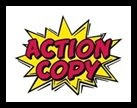
As a manufacturer of fighter jets and missiles, Lockheed has sizable contracts with the U.S. military. So does it consider the Pentagon to be the principal entity to please? Or perhaps Lockheed believes it's working for the American public in general? Company shareholders, maybe? The slogan raises a question it doesn't answer. Lockheed's management may know the company's priorities, but the rest of us are left in the dark.
And the slogan raises a disturbing possibility. Does Lockheed have a habit of forgetting who ordered its products? We certainly hope not. We wouldn’t want the company to forget that it was the United States who commissioned that F-16, and not Iran or North Korea.
Lastly, the slogan's grammar is incorrect. The ending-a-sentence-with-a-preposition issue is no big deal, but the slogan should be "We never forget whom we're working for." Granted, many consider the use of whom too stuffy for everyday English, but Lockheed isn't going after a happy-hour crowd. The company manufactures dangerous products that demand precision. Since the slogan doesn't reflect care in either meaning or mechanics, it should have been left on the drawing board.
Contribute Your Comments
Are there any slogans you think are badly written? What are they?
.gif)











